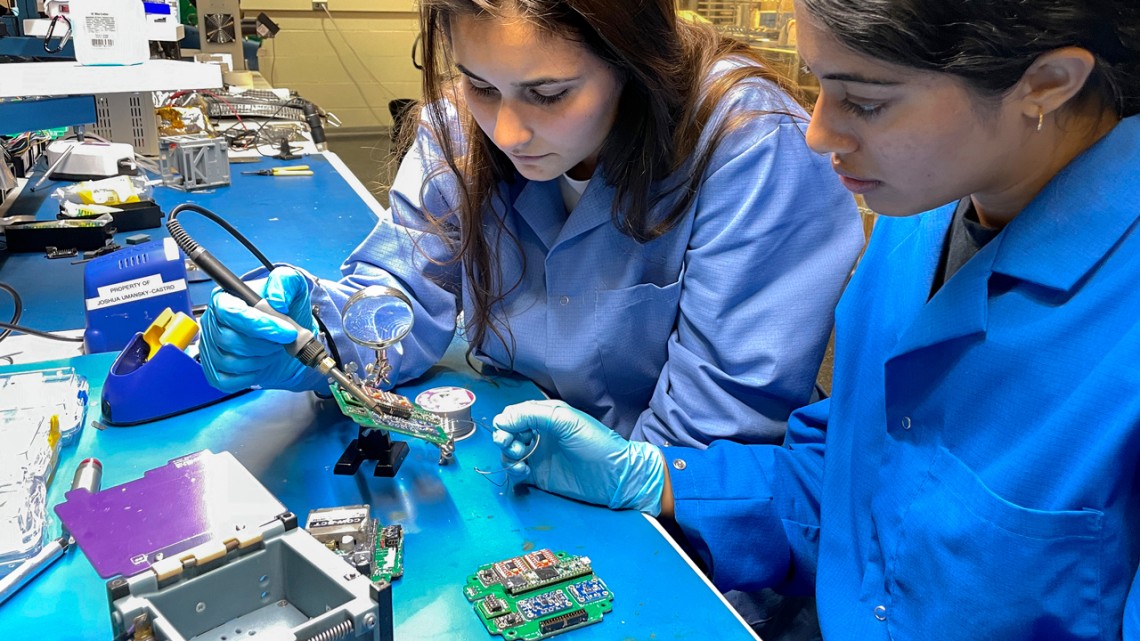
Students build and test spacecraft inside Cornell’s Space Systems Design Studio, one of several facilities that position the university to be the nexus of the New York Consortium for Space Technology Innovation and Development.
Cornell leads NYS consortium for space tech development
By Syl Kacapyr
Cornell is spearheading the New York Consortium for Space Technology Innovation and Development – a new initiative aimed at bolstering U.S. space technology research and manufacturing capabilities by uniting industry, academic and government partners across New York state.
Funded with a $5 million grant from the Defense Manufacturing Community Support Program run by the U.S. Department of Defense and $1.8 million from Cornell, the consortium is a collaborative effort led by Cornell’s Sibley School of Mechanical and Aerospace Engineering in partnership with the Cornell High Energy Synchrotron Source (CHESS) and the Cornell Center for Materials Research (CCMR).
“We’re creating a capability for New York and our collaborators in industry to design, build, test, integrate and maybe even operate space technologies that are going to make a difference in those companies’ ability to compete nationally and internationally,” said consortium executive director Mason Peck, the Stephen J. Fujikawa ’77 Professor of Astronautical Engineering.
Some of the funding will be used to upgrade facilities for research, development and testing of space technologies and related applications in Cornell’s High Voltage Laboratory, a 14,000-square-foot facility located on Mitchell Street.
Funding will also be used to provide small business assistance to consortium members along with specialized training and education through academic fellowships, internships and annual competitive grants for research and development.
“To drive innovation in space exploration, we must provide researchers with collaborative environments, brilliant minds and access to world-class facilities that empower them to tackle challenges that are quite literally out of this world,” said Krystyn Van Vliet, vice president for research and innovation. “Cornell excels in this regard, and our contributions will undoubtedly bring us closer to realizing some of humanity's most ambitious goals.”
The CHESS and CCMR facilities will serve as key locations where consortium partners can access Cornell research capabilities and expertise in materials science, biomaterials, living systems and nanofabrication for space technology development and testing.
“This opportunity underscores our commitment to deliver state-of-the-art synchrotron characterization capabilities to further Department of Defense priorities, and advance industry and manufacturing capabilities in New York,” said Joel Brock, CHESS director and the Given Foundation Professor of Engineering. “The consortium demonstrates the value the university brings when Cornell Research and Innovation partners together with academic departments to make great things happen.”
The consortium is the latest development in Cornell’s distinguished history of space technology and builds on other government investments involving Cornell, such as the NASA New York Space Grant Consortium and the U.S. Air Force Laboratory Regional Hub Network-Mid-Atlantic, both of which have agreed to be consortium members along with more than 20 industry, academic and government agencies.
“CCMR has long been dedicated to advancing technological growth and economic expansion through interdisciplinary collaborations. We look forward to helping to strengthen the national defense space technology industrial ecosystem through this new consortium,” said Frank Wise, CCMR director and the Samuel B. Eckert Professor of Engineering.
In addition to expanding workforce development, Peck said the consortium will position New York companies to technologically advance “big space” aspirations of the future, such as contributing to a sustained lunar presence or spacecraft for microgravity manufacturing.
“How do you build space infrastructure or very large objects in space, whether they’re for science, defense or commercial purposes? Fundamental research supports that,” said Peck, who leads Cornell’s Space Systems Design Studio and served a term as NASA’s chief technologist. “That’s why there’s a role for Cornell to help businesses in New York make a difference in their ability to pursue these kinds of challenges.”
Syl Kacapyr is associate director of marketing and communications for Cornell Engineering.
Media Contact
Get Cornell news delivered right to your inbox.
Subscribe

